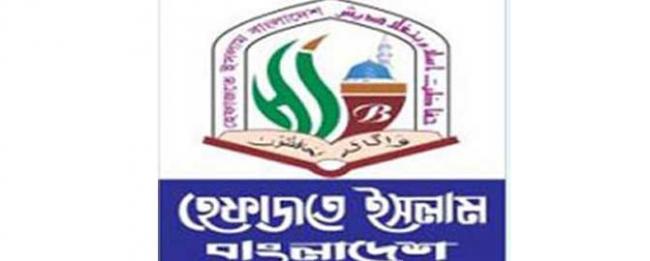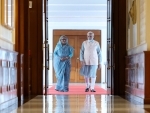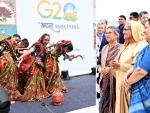Column

Perverted Islamist leader and BNP’s ally
“You women should stay within the four walls of your husband’s home, you should take care of your husband’s furniture and raise your children, your male kids. These are your jobs. Why do you have to go outside?” This is what BNP’s key ally Hifazat-e-Islam chief Allama Ahmed Shafi recently said in his sermon at Hathazari Madrassa.
Principal of Hathazari Madrassa in Chittagong, Allama Shafi, who now heads Bangladesh’s emerging Islamist radical group Hifazat-e-Islam thinks the conduct of women should be that of a ‘loyal, home-bound partner’ and nothing more.
He warns women: “Do not come out of your house. Do not roam naked on roads and at stations, markets and fields. Beware! Do not go shopping. Ask your husband and son to do the shopping. Why would you go outside? Ask your husband to bring this thing and that. You just sit and order your son. Why do you have to take the trouble?”
The Amir of Hifazat-e-Islam, which aligned itself to BNP Chairperson Khaleda Zia-led 18-party alliance and actively campaigned for the alliance-backed candidates in the recent polls to five city corporations, goes on: “Seeing women, your heart salivates in desire — You get aroused, desire to marry them, enter into a love marriage or a court marriage. These women are like tamarinds (a sour fruit). If you are studying with women day and night, your heart will not be able to control itself. You are walking on the streets and shaking hands (with women); you will not be able to control your heart.”
“No matter how pious you may be, if you shake hands with a woman, your heart will start having evil intentions. This is a Zina (unlawful sexual activity) of the mind, Zina of the heart, and soon it will turn into a real Zina, “says an obviously perverted Shafi. And then he shouts, “If a man tells me that he does not start having evil intentions when he sees a woman, then I will tell him: ‘Old man! You are suffering from impotency, your manhood has gone. That is why you do not get evil intentions when you see young women.”
Shafi goes on, “Women go to schools, colleges and universities; let them study up to class four or five. After marriage, keeping record of their husbands’ finances is enough for them.”
He elaborates further "You are spending lakhs of Taka for sending them to schools, colleges and universities. But, after a few days, your daughter will get a husband of her own, enter into a love marriage or a court marriage or elope with a boyfriend. She will not remember her father.”
This comment about women comes from Shafi, who is considered to be a top Islamic cleric and spiritual leader. Shafi is totally against liberty, education and employment of women as he preaches his followers. The video clip of his sermon is now available on Facebook and YouTube. The Principal of Chittagong-based Hathazari Madrasa Allama Shafi also heads the Qaumi Madrasa Education Board in the country.
In the video clip Shafi asks his followers “Why are you sending your daughters to work in garment factories?” And he goes on with his sweeping views on these poor, need-driven garment employees, “She goes to work after Fajr Namaj (praying time) at 7/8:00am and does not come back even at 8/10/12 at night.”
The insinuation continues: “You do not know which man she is hanging out with. You do not know how much Zina she is getting involved in. Through Zina, she is earning money, which does not bring prosperity.”
Shafi states he is disturbed by the mobile phone. Terming the present times as an “age of mobile phone,” he says, “Students, both boys and girls, have mobile phones. The male students collect the phone numbers of female ones while female students go to schools and colleges and collect the phone numbers of male students. This is what is going on in the name of education.”
In his sermon, Shafi strongly opposes family planning and birth control. He exhorted men to go for up to four marriages and father as many children as possible mentioning that Prophet Muhammad had entered into 11 marriages.
His views about women, medieval in nature, stunned the nation as women’s education in the country needs much more extra focus and commitment at this stage. Religious extremists who are against women’s education and development in Bangladesh have been using ‘Fatwa’ (religious edicts) as a major tool to suppress women and violate women’s rights as part of their attempts to propagate their ideology. There are instances where women, accused of “immoral behaviour”, have been raped. The latest such incident occurred recently when a 14-year-old rape victim Hena was ordered to receive 100 lashes as per a fatwa issued by a village Imam, though the rapist, a relative, was not punished. The girl fainted half way through the flogging and later died.
Between 2000 and 2012, 503 women fell victim to fatwa issued by religious fanatics accusing them of adultery. Most of these women were from rural areas, where their crimes were determined by influential local leaders and mullahs who, setting aside the laws of the land, have taken upon themselves the responsibility of dictating social and moral standards of behavior, interpreting religion and meting out extra judicial punishments. Hifazat’s comments angered women who reacted saying “ It seems that the Hifazat leader wants to take the country towards Afghanistan. But the people will never allow it.”
Hifazat-e-Islam was launched to oppose the newly adopted women’s development policy and the amendments brought to the country’s constitution in line with the spirit of its original 1972 version. The Sheikh Hasina led government has approved the National Women Development Policy 2011 with a provision of equal share of women in property and equal opportunity in employment and business. The policy is the revival of 1997 Women Development Policy, to the fulfillment of an election pledge made by the ruling Awami League. The 1997 policy was formulated during the previous tenure of the party. But it was discarded when the BNP-Jamaat came to power in 2001.
Hifazat-e-Islam took centre stage as a force opposed to the popular Shahbagh movement that began on February 5 to press for maximum punishment to war criminals. The organization’s 13-point charter of demand, announced at its April 6 rally in the capital Dhaka, includes a ban on all foreign culture, free mingling of men and women and candlelight vigils. It wants anti-blasphemy law introduced with provision of death penalty and exemplary punishment to any, such as bloggers, who “insult Islam”. Among other Taliban style demands are: calls for cancellation of Bangladesh’s women development policy, an end to ‘shameless behaviour and dresses’ and declaration of Ahmediyas as non-Muslim. It is surprising that senior BNP leaders including Standing Committee member Khandakar Mosharraf Hossen and Vice Chairman Sadeque Hossen Khoka joined the Hifazat’s rally in Dhaka to express solidarity on behalf of BNP Chairperson Khaleda Zia and extend support to the Hifazat’s demands.
If Khaleda Zia manages to stage a come-back to power with Jamaat and Hifazat as her principal allies, she can only take the country back to the medieval ages and undo all the progress Bangladesh can be rightly proud of. She had earlier incurred displeasure of the freedom fighters and progressive sections of the society. When Khaleda Zia-led government was in power, freedom fighters with Pakistani bullets in their body had to put up with the sight of Jamaat ministers breezing past, the Bangladeshi flag flying on the bonnet of their ministerial car. Those who had not believed in the independence of Bangladesh and collaborated with the Pakistani occupation forces to thwart the birth of Bangladesh were flying its flags and the people who had fought for the country’s flag and independence were reduced to helpless pedestrians.
By its association with Hifazat-e-Islam, BNP has already antagonized women who constitute almost 90 percent of the 3.5 million garment workers accounting for 70 per cent of the total female employment in the manufacturing sector. Exports of textiles and garments, two industries where women workers far out surpass men, are the principal source of foreign exchange earnings of Bangladesh. About half the country’s 150 million population are women and they are contributing a significant proportion to the GDP (gross domestic product) of the country. Employed female population in Bangladesh is around 17 million, which was around 10 million in 2002-03. Women employment is almost half that of male employment. This is counted as a big achievement in terms of women empowerment policy of Prime Minister Sheikh Hasina. These facts should not be overlooked or ignored by BNP if it is sincere about its electoral prospects.



